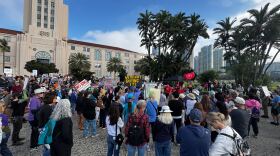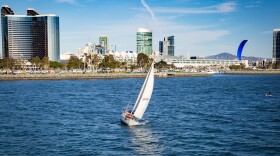The U.S. economy might officially be growing again after the most damaging recession in decades, but the pain is far from over.
The long-awaited ray of good news came from the Commerce Department, which announced Thursday that the U.S. economy grew a modest 3.5 percent in the third quarter of this year — the fastest pace in two years.
The jump was above most economists' projections, although it will do little to reverse Americans' gloom about the economy in the short term.
"We're no longer simply on the roller coaster to hell," says Donald Luskin, the chief investment officer for Trend Macrolytics, LLC, an economics consulting firm. "But the idea of returning back to normal growth levels? That will be well into next year."
Unemployment is expected to continue growing over the next several months, peaking at over 10 percent. Consumer confidence is still dropping, and new home sales fell unexpectedly last month.
Not A Normal Recession. Not A Normal Recovery?
Overall, however, most economists agree that the recovery appears real. Exports are rising, home building is recovering, and real-estate prices have risen for four consecutive months. Consumer spending surged 3.4 percent last quarter as well, the first advance since the third quarter of 2007.
But it's not clear that this rebound will follow the typical post-recession pattern, where sharp contractions are followed by large growth spurts.
"In a normal recession, the leaves fall off the trees because it's autumn," says Luskin. "In this recession, the leaves fell off the trees because there was an enormous forest fire. It's a little bit of uncharted territory to know how long it will take to come out of that."
This time, the damage was so severe that companies and consumers alike appear more reticent to return to their old habits. With Americans still adjusting to the tough new economic realities, consumer spending might not recover for quite some time.
"We have seen a permanent change in consumer behavior after seeing their retirement savings and home values go down," says Gus Faucher, the director of macroeconomics at Moody's Economy.com. "People are going to be more cautious coming out of this recession than they have in previous recessions because of the depth of the downturn."
Companies, shaken by the near-collapse of the credit markets, will be looking for signs that the recovery is sustained.
But Faucher notes that much of the jump in gross domestic product last quarter can be traced to the Obama administration's stimulus spending. This suggests that the underlying economy might be bouncing back more slowly than the 3.5 percent growth figure might indicate.
"The economy will continue to expand, but more slowly in the fourth quarter of 2009 and the first quarter of 2010, as some of those government supports are removed," says Faucher. He expects growth to pick up more substantially in the second half of 2010.
Even with this growth, he adds, "the economy is still much smaller than it was before the recession started."
Expect Job Growth To Lag
Job growth could be a bigger problem. Even in typical recessions, rebounds in employment lag behind GDP growth. But the gap could be even larger this time.
"Current forecasts do not predict substantial employment gains in 2010, and unemployment is unlikely to end 2010 much below its current levels," White House economic adviser Christina Romer said in a speech on Monday.
For one thing, the U.S. economy has shed a stunning 7.2 million jobs since December 2007.
But beyond the 9.8 percent unemployment rate, there are also record numbers of underemployed Americans — those working part-time, but who are seeking full-time work. When companies need to boost their output, they will likely boost the hours of those part-time workers before hiring new ones.
"We have more of these part-timers we have to burn through before we can start hiring than ever before in history," says Luskin. "The people who are really hurting — the ones who are working zero days a week — are actually last in line to get relief."
The U.S. government is scheduled to release new unemployment figures next week. Most economists predict another slight rise in the jobless rate.





